| |
 |
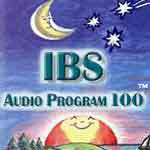
Gut-directed hypnosis is one of the most effective ways to help relieve all IBS symptoms! Results can last more than 5 years.

In this Issue...
Food & Recipes
Special Events
Rx News & Research
Ask Heather
About Us

Organic Acacia
Soluble Fiber
The prebiotic fiber that reduces bloating & gas!

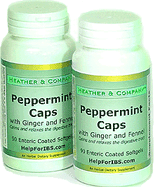
Try Peppermint Caps
Peppermint Caps are the best for abdominal spasms, cramps and pain!

Get the IBS Diet Kit!
With Eating for IBS, plus organic fennel tea for bloating and gas, plus peppermint caps to prevent spasms and pain.
Take control of your IBS!

Get stable now ~
and stay that way!
Did you miss the latest
IBS newsletter and
Banana Buckwheat Pancakes?
Past issues
are posted here!

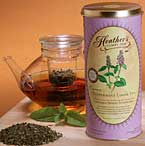
Try Heather's
Peppermint Tummy Tea
Peppermint is a smooth muscle relaxant and has pain-killing properties. Our tea is large leaf with a high volatile oil content - much stronger than tea bags!

The IBS Starter Kit!
Learn every way possible to successfully manage your symptoms!
With the First Year: IBS, an essential guide, plus Eating for IBS, plus Acacia Tummy Fiber to start stabilizing immediately!
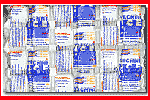
Heat Therapy for
IBS
Hot packs can help prevent stress-related attacks!
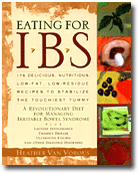
Delicious Recipes
for IBS!
Learn how to eat well and feel better

Fennel Tummy Tea for
IBS Bloating & Gas
Fennel has anti-spasmodic properties and it stimulates the production of gastric juices. Fennel tea is the best for relieving bloating and gas!
|
 |
|
| |

IF YOUR NEWSLETTER IS HARD TO READ OR IF THE LINKS DON'T WORK,
Please copy and paste this address into your browser window:
http://www.helpforibs.com/news/newsletter/tunamelt033104.html
March 30, 2004
This week ~ Probiotics, Irritable Bowel Syndrome, & Ulcerative Colitis
 Twitter Twitter

Hello to everyone -
This week we have several particularly interesting digestive health news stories, the last of our Seven Sneaky Sins of the IBS Diet, and a deliciously old-fashioned tuna melt sandwich. Enjoy!
Best Wishes,
Heather Van Vorous
Note: Did a friend send you this newsletter? Sign up here for your own free subscription.

Tuna Melt Sandwiches
Makes 2 large sandwiches
1 6-oz. can white tuna in water, drained
2 T fat free mayonnaise
2 t finely diced onion
1/2 t celery seed
squirt fresh lemon juice
salt and pepper to taste
several thin tomato slices
2 slices American or Cheddar soy/rice/almond cheese
4 medium slices fresh white bread
Heat a large nonstick skillet over medium heat. While the skillet heats, in a small bowl combine drained tuna, mayo, onion, celery seed, lemon juice, salt, and pepper. Blend well with a fork. Spread tuna evenly over two bread slices, top each with thin tomato slices and one slice of soy cheese. Top with remaining bread slices.
Spray skillet with cooking oil such as Pam. Add sandwiches and grill until golden brown on the bottom. Flip sandwiches with a spatula and grill until other side is golden brown. Serve hot with baked potato chips. For a delicious variation try pepper jack soy cheese.
For oodles of delicious recipes, come visit the IBS Recipe Exchange Message Board!
Are you just learning how to eat for IBS? A little intimidated at the thought of special IBS recipes? Don't worry! Come see
the IBS Diet pages, and find the answers to all your questions.
 New IBS Support Groups are Meeting!
New IBS Support Groups are Meeting!
I am thrilled to announce that there are two new IBS support groups now meeting in the US - one in Baltimore, Maryland and the other in Decatur, Texas. The Baltimore group is being led by Jen, who's planning a fabulous spring picnic on April 17th for the very first meeting. It's an IBS-friendly potluck, so bring your favorite digestion-friendly recipe (stumped for ideas? There are hundreds of delicious options right here!). So come join the Baltimore IBS Support Group and let Jen know you'll be seeing her soon at the picnic.
The Decatur group, known as FibroCOURAGE, is led by Carolyn, and she warmly welcomes everyone with fibromyalgia and/or IBS. Carolyn's group meets the first Tuesday of every month at the Fit-n-Wise Community Wellness Center, in the Training Zone Cafe. Their meetings are from 4-5 pm. The Decatur group will meet next on April 6, and a massage therapist will speak at the meeting. Families and children are welcome, and the Easter Bunny may stop by!
Come join the Decatur IBS & Fibromyalgia Support Group and say hello to Carolyn.
If you're interested in starting an IBS Support Group in your own area, please come look for your city and state on the main IBS Support Board. We'll see you there!
 A Link Between IBS and Fibromyalgia
A Link Between IBS and Fibromyalgia
A test for microbes in the intestine, known as the lactulose breath test (LBT), may provide a link between fibromyalgia and irritable bowel syndrome (IBS), new research suggests. Fibromyalgia is a painful muscle condition and IBS is an intestinal disorder associated with pain, bloating, and diarrhea.
Dr. Mark Pimentel from Cedars-Sinai Medical Center, Los Angeles, California and colleagues note that nearly a third of fibromyalgia patients in some studies are also diagnosed with IBS, suggesting a link between the two disorders.
The researchers tested their hypothesis that the LBT would be abnormal in both IBS and fibromyalgia by performing the test in 42 fibromyalgia patients, 111 IBS patients, and 15 healthy subjects. The findings are reported in the Annals of the Rheumatic Diseases.
All 42 patients with fibromyalgia had an abnormal LBT result, as did 93 (84 percent) of IBS patients but only three (20 percent) of the controls. Moreover, the amount of hydrogen gas produced during the LBT seemed to correlate with the degree of pain in fibromyalgia patients. Check here for more
information about this study...
Bacteria Basics - Probiotics for IBS and IBD
Probiotics - which means "for life" - are so-called "friendly bacteria" which are believed to be beneficial in maintaining a healthy digestive system.
The human gut is home to around 400 different species of bugs, some good, and some bad. The Lactobacillus and Bifidobacterium lurking there are probiotic species of bugs which aid digestion by breaking down tough fibres, enzymes and other proteins in our food. Probiotics also produce important nutrients such as vitamin K, and ferment organic acids which are absorbed into the bloodstream for energy. However, these good guys have to share their habitat with bad bugs such as E.Coli, Salmonella and Clostridium - bugs which are responsible for most bouts of diarrhoea, and which can prove fatal.
The balance between the good and bad bacteria is key to maintaining good digestive health, and when all is well our digestive systems are a relatively stable "microflora".
Stress, illness and prescription medicines can all play havoc with the bacterial balance. Antibiotics pose particular problems, because as well as killing off the bad bacteria for which they were prescribed, they kill off the good guys too.
It is in a bid to restore balance - or guard against imbalance - that most people turn to probiotic products. Over the past century or so probiotics have been credited with alleviating symptoms in a range of illnesses, from constipation and irritable bowel syndrome, to more serious gut complaints such as ulcerative colitis and Crohn's disease. They have also been applied in the treatment of vaginal, urinary tract, dental, ear and wound infections. In addition, they have been shown to reduce the length of illness in some of the 100,000 cases of food poisoning seen in the UK annually due to pathogen - or disease causing - bacteria.
Professor George MacFarlane, a bacteriologist at the Medical Research Council Microbiology and Gut Biology Unit at Ninewells Hospital in Dundee, may have found a way to make the "probiotic hit" more effective. Researchers recently completed a pilot study in ulcerative colitis of a "synbiotic" - a prebiotic given in combination with a probiotic - which he says gives the probiotic a better opportunity to establish itself in the bowel.
So just how big is the body of scientific evidence that probiotics actually work?
Check here for more
information...
Check here for information about the prebiotic Acacia...
Healthy Twist - UCLA Med School Prof Recommends Yoga for IBS
Even doctors need medical help once in a while, and that's how Dr. Richard Usatine discovered yoga. The former UCLA medical school professor suffered a back injury in a car accident. After a year of failed attempts to get rid of the pain, Usatine was willing to try anything. He went to see a friend and colleague who specialized in physical medicine. The prescription came as a surprise. Try yoga, the friend said.
Yoga worked so well that Usatine now recommends the ancient practice to patients who complain about stress-related conditions. He also researched yoga and its potential benefits for 20 health conditions in a book called "Yoga Rx." The book, which recommends yoga for a range of problems from asthma to back pain to irritable bowel syndrome, was published last year with yoga therapist Larry Payne.
"I'm a believer," says Usatine, now a professor of family and community medicine at the University of Texas Health Science Center in San Antonio. "I'm in favor of more studies on yoga, but I don't need them to prescribe it. What's most important is that yoga is exercise and relaxation therapy."
Usatine is among the growing ranks of medical doctors intrigued by yoga and its combination of deep breathing, stretching and strength-building. In the early 1990s, best-selling author Dr. Dean Ornish included yoga as part of his nutrition and exercise recommendations for heart health. Today it's not unusual for doctors in pain management, heart health and other specialties to suggest yoga and for hospitals to offer classes to their patients.
This openness to yoga as therapy in part reflects an acceptance of the mind-body connection, doctors say. Only a few randomized controlled clinical trials, the gold standard of medical research, have been conducted on yoga. But doctors who are yoga enthusiasts say it's easy to extrapolate from studies that have documented the ill effects of chronic stress on the immune system and the benefits of exercise and relaxation.
Check here for more
information...
Check here for specific yoga poses for IBS...
Heartburn May Not Reflect Gastroesophageal Reflux Disease Severity
Particularly in the elderly, the severity of heartburn may not reflect the severity of erosive gastroesophageal reflux disease, according to a report in the March issue of Gastroenterology.
"Gastroesophageal reflux disease is common in adults of all ages, but its complications are more frequent in elderly patients," Dr. David A. Johnson, of Eastern Virginia Medical School, in Norfolk and Dr. Brian Fennerty of Oregon Health Sciences University, Portland, point out.
To investigate further, the researchers examined the relationship of age, severe heartburn symptoms, and severe erosive esophagitis. The team pooled data from five prospective, randomized, controlled trials that examined the effect of proton pump inhibitors on healing of erosive esophagitis and symptom resolution. Involved in the study were 11,945 patients with gastroesophageal reflux disease and erosive esophagitis.
The investigators observed a progressive increase in the prevalence of severe erosive esophagitis with each decade of age. In patients younger than 21 years, only 12% had severe esophagitis at baseline, compared with 37% of those older than 70 years.
Check here for more
information...
Systematic Review: The Role of Different Types of Fibre in IBS
This systematic review shows that there is conflicting evidence for the effectiveness of fibre in the treatment of irritable bowel syndrome symptoms, as soluble and insoluble fibers affected irritable bowel syndrome symptoms differently. For the measure of efficacy, i.e. the proportion of patients with global irritable bowel syndrome symptom improvement, fibre was significantly better than control.
The two types of fibre, soluble and insoluble, affected irritable bowel syndrome symptoms differently. Soluble fibre was beneficial to global symptom improvement, whereas insoluble fibre was not more effective than placebo and may, in some irritable bowel syndrome patients, worsen symptoms when compared with a normal diet.
Evidence for the effectiveness of soluble fibre was obtained from the pooled results. Irritable bowel syndrome patients treated with this type of fibre reported 1.3 times more global improvement than controls. The effect of soluble fibre on irritable bowel syndrome-related abdominal pain, however, was controversial.
The efficacy of insoluble fibre in the treatment of irritable bowel syndrome patients was also controversial. The studies showed that diets with a large amount of insoluble fibre might actually be worse than a normal diet. The clinical improvement of irritable bowel syndrome patients treated with insoluble fibre was no better than that obtained with placebo.For the development of evidence-based management guidelines, valid clinical studies in primary care patients, focusing on the effectiveness and tolerability of soluble and insoluble fibre, are needed.
Check here for more
information...
Studies Link High-Fiber Carbs to Lower Body Weights
The thinnest people eat the most carbs, a four-nation survey shows. If you've been following the latest U.S. diet fads, that isn't what you'd expect. But the data come from an intensive, four-nation study of more than 4,000 men and women age 40 to 59. The study was based on food diaries kept by people in the U.S., U.K., Japan, and China.
Study leader Linda Van Horn, PhD, of Northwestern University, presented the findings. "Without exception, a high-complex-carbohydrate, high-vegetable-protein diet is associated with low body mass," Van Horn said in a news conference. "High-protein diets were associated with higher body weight."
Check here for more
information...
Looking for the latest IBS research and news?
Check out the IBS Research Library!
 Common Pitfalls ~ The Seven Sneaky Deadly Sins of the IBS Diet
Common Pitfalls ~ The Seven Sneaky Deadly Sins of the IBS Diet
"I'm following the Eating for IBS diet, but I still have problems. What am I doing wrong?"
I hear from many people who have made a great effort to modify their diet for IBS, but who still have abdominal symptoms they feel certain are associated with their eating habits. They're often very frustrated because they believe that there aren't any steps left for them to take. The good news here is that it's much more likely than not that there are still dietary triggers involved, they're simply being overlooked.
I've found that there are seven specific pitfalls that ensnare many people as they adjust their diet - let's call them the Seven Sneaky Deadly Sins of the IBS Diet:
1. Coffee (yes, decaf counts)
2. Yogurt (it's the safest dairy product for IBS...isn't it?)
3. Alcohol (just one glass of wine is okay, right?)
4. Vitamin supplements (they're good for you, aren't they?)
5. No insoluble fiber foods (they're triggers, so you just don't eat them, right?)
6. Too low a dosage of soluble fiber supplements
7. Not drinking enough water (doesn't soda pop count?)
Last on the list is...
#7. I drink water when I'm thirsty, and I have several glasses of soda pop each day, and I don't feel like I'm dehydrated. Shouldn't this mean that I'm getting enough water?
Fresh water is crucial for good health in all respects, but is especially important for keeping your digestive tract functioning properly. In particular, soluble fiber, which is the basis of the IBS diet, requires plenty of water in order to be effective. (Remember, soluble fiber works by absorbing liquids in the digestive tract to form a stabilizing gel that relieves and prevents both diarrhea and constipation.)
Together, fiber and water maintain gastrointestinal muscle tone, dilute toxic wastes in the GI tract, bind irritants, bring oxygen to the tissues, and help maintain the correct balance of intestinal flora. In general, the more water you drink the better, whether plain or as IBS-friendly herbal teas.
Please note that not just any liquid can substitute for fresh water, however. Beverages with caffeine - black or green tea, soda pop, coffee - can actually dehydrate you further, and this is on top of the fact that they also contain ingredients that are outright harmful to IBS. Coffee is such a strong GI irritant that it was the first deadly sin, while black tea contains tannins that can trigger acid reflux in susceptible people. Decaffeinated black or green tea may be more tolerable.
Soda pop, however, is one of the worst possible beverages for IBS. It's sweetened with either high fructose corn syrup or artificial sweeteners, both of which are likely to cause GI upsets. Carbonation triggers bloating, gas, and even abdominal cramping. Most sodas are full of artificial colors and flavors, both of which can bother sensitive GI tracts. The caffeine in sodas is just the last in a long list of detrimental ingredients, and it's problematic both because it is a stimulant (and can upset the rhythmic contractions of the gut), and due to its dehydrating effect. Do your digestion a favor and get in the habit of drinking plain fresh water, or caffeine-free herbal teas such as peppermint, fennel, chamomile, and anise.
At a bare minimum, make sure you're drinking at least 64 fluid ounces (eight cups) of fresh water each and every day, and aim for at least twice that amount. (Research has actually shown that a person can safely drink up to 10 liters of water a day.) You may find yourself constantly running to the bathroom as you initially increase your water intake, but your bladder should adjust and become comfortable with your new routine after a week or two.
Many Americans are actually chronically dehydrated without ever realizing it, and this is a huge exacerbating factor (and sometimes even the underlying cause) for constipation. If you're on the opposite end of the spectrum and prone to diarrhea, you're at risk of losing too much water from your body too rapidly, and this can then result in dehydration. So no matter what your IBS symptoms, and whether they're flaring or in remission, please drink up!
This was the last in the series of the Seven Sneaky Deadly Sins of the IBS Diet. To review all of the previous sins, check here.
 Heather & Company for IBS, LLC is dedicated to serving people with Irritable Bowel Syndrome. Our mission is to provide education, support, and products that allow people with IBS to successfully manage their symptoms through lifestyle modifications.
Heather & Company for IBS, LLC is dedicated to serving people with Irritable Bowel Syndrome. Our mission is to provide education, support, and products that allow people with IBS to successfully manage their symptoms through lifestyle modifications.
We offer extensive information and tangible help for IBS, including the world's best-selling and best-reviewed books for the disorder. We provide the internet's top IBS web site resources; a twice-monthly IBS Newsletter; seminars and classes; dietary brochures for patient distribution by health care professionals; an IBS Research Library; and Heather Cooks!, a healthy cooking show on Seattle television. Much of our work is based on Heather's development of the first and only comprehensive IBS dietary guidelines and recipes, an achievement which has earned numerous awards and accolades as well as thousands of thank you letters from IBS sufferers.
Heather & Company also provides the only patient-expert moderated IBS Message Boards on the internet with forums for diet, recipes, hypnotherapy, yoga, plus Crohn's and Colitis. In addition, we support and coordinate the formation and continuation of local in-person IBS support groups across the USA, Canada, the UK, Australia, and New Zealand. We will soon have other IBS services and products available.
Our website receives over 2 million visits each year, and our newsletter is sent to over 21,000 people. We are regular exhibitors at the Digestive Disease Week and American Dietetic Association conferences.
Sponsorship opportunities are available for the message boards and this newsletter for companies and/or products that have been legitimately established as helpful for digestive disorders.
Please contact us for information.

You are receiving this email because you have expressed interest in IBS news and information.
To unsubscribe from Heather's IBS Newsletter, click here http://www.helpforibs.com/news/unsub.asp or send an email to heather@helpforibs.com.
If you are viewing this newsletter on a website and would like to subscribe for email delivery, please "Join the IBS Newsletter" here.
ANTI-SPAM PRIVACY POLICY
LEGAL DISCLAIMER - This email is not intended to replace the services of a physician, nor does it constitute a doctor-patient relationship. Any application of the recommendations in this email is at the reader's discretion. Heather Van Vorous and Heather & Company for IBS, LLC are not liable for any direct or indirect claim, loss or damage resulting from use of this email and/or any web site(s) linked to/from it. Readers should consult their own physicians concerning the recommendations in this email.
Heather & Company for IBS, LLC
409 10th Avenue East Suite 202
Seattle, WA 98102 USA
© 2004 Heather & Company for IBS, LLC. All rights reserved.
|
|
|
|